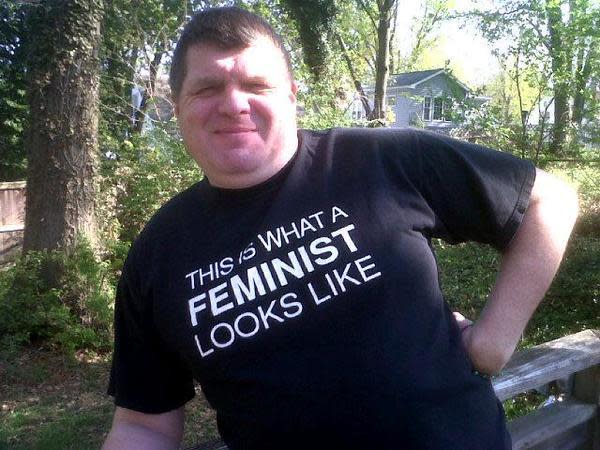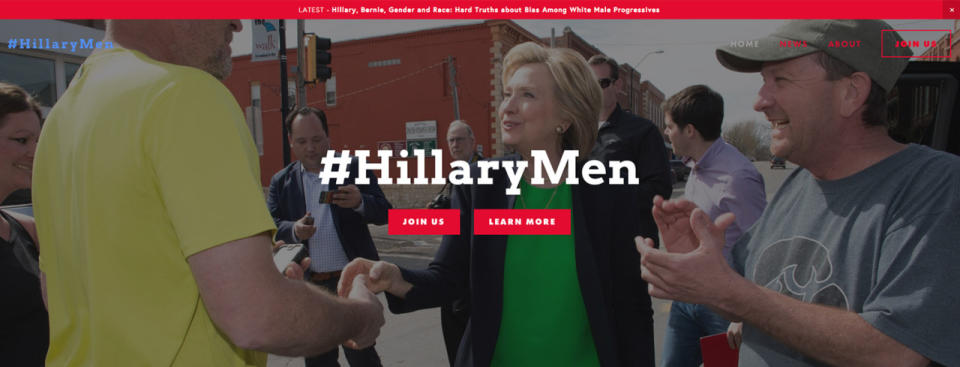Inside the world of #HillaryMen, the male feminists who want Clinton to be president

Hillary Clinton at the Annual Hawkeye Labor Council A.F.L.-C.I.O. Labor Day picnic in Cedar Rapids, Iowa. (Photo: David Greedy/Getty Images.)
“I should make it clear: I’m a feminist,” 53-year-old Fergal Murphy told me over the phone from his home in Kensington, Md. Almost immediately I heard a faint giggle followed by some clapping. His wife, Karen, was on the line too and couldn’t suppress how tickled she was by his statement.
“I brag about this all the time online,” she said, explaining that it all started a few years ago when she bought a shirt that read “This Is What a Feminist Looks Like.”
Fergal loved the shirt and promptly began wearing it. Sometimes he even poses for photos in it next to a life-size cardboard cutout of Hillary Clinton, like when the couple, staunch Clinton supporters, holds presidential primary debate watch parties in their home. “You’d be amazed at how many times I showed this picture of him in his T-shirt,” she said.

Clinton supporter Fergal Murphy. (Photo courtesy of Karen Murphy).
But Karen Murphy doesn’t blow up her friends’ Facebook feeds just to brag about her husband’s feminist declarations. A Clinton campaign volunteer, she posts about him as a way of building support for the former secretary of state and Democratic presidential frontrunner.
“I use it as a way of reinforcing the idea that this is not just about women supporting a woman,” she said. “It’s about people fighting for what you know is best for their family and the future of their country.”
The Murphys are part of a growing Hillary Clinton-supporter support group called #HillaryMen. Launched four months ago by former Clinton campaign digital strategist Peter Daou and Columbia lecturer Tom Watson, the unlikely site is a coalition of “fathers, brothers, husbands and sons” dedicated to dissecting the discussion around Clinton’s campaign with an eye toward identifying and fighting back against sexism in campaign 2016.

The #HillaryMen homepage.
Most of the time, that means keeping a close watch on the words the media, super-PACs and political pundits use to describe the former first lady and U.S. senator from New York. Other times, it’s about sharing stories from families like the Murphys about how Clinton has made a difference in their lives. But mostly, Daou says, it’s about having a comfortable forum — whether that comes in the form of a Facebook thread or a Listserv — for men to openly express their support of a female candidate.
“A lot of the motivation we have is to create that safe space for men across the country for any political conversation,” Daou told Yahoo News. “We are men and we support Hillary for very specific reasons that we’ve laid out. We’d love to create a place where other men are not afraid to do it.”
Clinton’s campaign has done a huge amount of work reaching out to women online, from proudly proclaiming she’s a feminist in an interview with Lena Dunham to texting out gifs of her 1995 Women’s Conference speech in Beijing. At the same time, though, doubts about her standing with men have never been far from the surface. “Can Hillary Clinton win over men?” conservative columnist S.E. Cupp wondered aloud in an April CNN article, concluding “she might want to figure out a way to court the other sex.”
Those sentiments were only amplified by the release of an early-October Quinnipiac University poll that said Hillary Clinton was unpopular with Democratic men (which Daou and Watson later challenged). “Are Men Souring on Hillary Clinton?” the Huffington Post wondered. The National Journal’s Josh Kraushaar warned that an “unprecedented level of resistance to her candidacy among men is undermining the conventional wisdom that she’d be the strongest Democratic nominee in the general election.”
#HillaryMen is aiming to push back against the view that only women back her. Needless to say, Daou and Watson have been kept very busy.
Neither a super-PAC nor an official affiliate of the Clinton campaign, according to Daou (and a search on OpenSecrets.org), #HillaryMen runs off the kindness of about four core volunteers. It has amassed a small but dedicated following, earning several thousand unique visitors to its site per day — a number that rises and falls depending on the level of criticism Clinton faces in the news cycle. The articles that the writing duo post to the website are typically shared on Facebook and Twitter, where they reach thousands (a small sum compared to the millions reached by Clinton herself) and have earned the online attention of other pro-Clinton Democrats, such as former Vermont Gov. Howard Dean, political strategist Donna Brazile, and CNN commentator Paul Begala, also a former Bill Clinton strategist.
Though both Daou and Watson have full-time jobs running media consultancy firms, they’re well-positioned to spend their free time building steam for a political cause. Daou was an early political blogger and a veteran of both John Kerry’s 2004 presidential campaign and Clinton’s 2008 bid for the Democratic nomination, where he served as senior digital adviser. Watson is a Columbia University lecturer who advises companies and nonprofits on how they can promote social activism. The two became aware of each other through the “political blog scene” around 2003 and met for the first time in person in 2006, when Daou was working at the Clinton Global Initiative and invited Watson to come to one of its open roundtables.
“Actually the first time we met, there was Bill Clinton in the room,” Daou said. “Kind of funny, when you think about it.”
Since then, they’ve become close friends. They get lunch in Manhattan sometimes, but most of the work for #HillaryMen is done remotely from their homes in New York. Whenever the two produce a new column — which may range from such topics as “ The Top Five Worst Justifications for Sexism in 2016” to, most recently, “ Hard Truths About Bias Among White Male Progressives” — they send it around to a group of other dedicated Hillary volunteers to get feedback (and to make sure there are no typos). These posts often expose what they see as unfair terms used to describe Clinton, such as “calculating” and “manipulative,” descriptions they say originate in focus groups run by Republican super-PACs as part of their effort to chip away at Clinton’s reputation (the New York Times reported on that strategy in July). When the duo are ready to distribute their latest post, the story is blasted out to their subscription list and posted on Facebook and Twitter.
The reaction to the #HillaryMen columns vary, depending on who’s reading them. Daou and Watson said they were surprised that aligning their views with pro-Clinton feminism has led to some progressive blowback. Others, they say, feel their focus is filling a void.
I just read a post on the #HillaryMen site & I’m seriously thinking of moving to a swing state and voting republican.
— Tom the Turkey (@firetomfriedman)
“There are quite a few comments from people saying this is eye opening,” said Ahmir Rashid, a 34-year-old Clinton campaign volunteer who is part of the circle that reads over the #HillaryMen columns before they’re sent out. “They’re in two groups: One is saying, ‘I’ve noticed this for so long, I’m so glad someone is talking about it.’ The second is of people saying ‘Oh, now that you mention it, that does make a little sense.’”
Passionate discussion about gender — along with accusations of sexism — are well on their way to becoming a hallmark of campaign 2016. As Bernie Sanders rose in popularity, caricatures sprung up about a type of man backing him, the “Berniebro.” “The Berniebro asks what you thought of the first Democratic debate, then interrupts to say that you shouldn’t confuse Clinton’s sound bites for actual substance,” Robinson Meyer wrote for the Atlantic in October, painting a portrait of an arrogant political supporter who spent a lot of time shutting down other people’s opinions on social media. Slate.com’s Michelle Goldberg argued that the Sanders campaign has “unleashed a minor plague of progressive white men confidently explaining feminism to the rest of us,” especially when it comes to why they oppose Clinton.
In any scenario where a bunch of dudes attempt to mansplain women’s rights, tension arises. Take, for example, author and academic Vivek Wadhwa, co-author of the book Innovating Women and longtime tech diversity advocate. After striking what his critics called a “paternal and patronizing” tone in his encouragement for women to be more heavily integrated in the tech industry, many female tech workers called for him to stop speaking for their movement. They argued that as a male who didn’t understand the female experience, he was hurting the cause more than helping. Wadhwa ended up formally removing himself from the “women in tech” debate in a column for the Washington Post, conceding “The women who I have written about, who have lived the discrimination and abuse, as well as others, deserve the air time.”
Still, no major feminist groups have taken issues with the #HillaryMen effort. (Aside from some occasional eye-rolling on social media). And all but one member I spoke to was quick to clarify that their project is not meant as a way to replace women talking about gender bias in the election, but to amplify female voices.
“I, by no means, want to say we’re speaking on behalf of women or in place of them,” Rashid said. “We’re just calling out the bias that exists that Peter and Tom usually see.”
In taking on feminist issues, many members say they’re now more familiar with the dark side of the female digital experience: being on the receiving end of abusive language. This phenomenon, which they say almost always comes from white men, is something many men had only previously heard about from their female blogger friends.
“Attacks are as deeply personal as you get,” Daou said. “I’ve had a whole rash of people coming at me, almost always from anonymous accounts, going after our manhood, using very degrading pictures and saying ‘Oh, these are the Hillary Men.’”
That day when several hundred #Hillary-haters unleashed their venom on me for backing the woman who will be their president. #HillaryMen
— Peter Daou (@peterdaou)
“There’s been pushback of people saying Hillary men must be gay, or whipped, or some other sundry term for being under female control,” Rashid confirms. “It shows the need for calling out a gender bias that exists.”
These reactions are only encouraging to Daou and Watson, who say they hope to add more charts, interactives and graphs to #HillaryMen and eventually move onto organizing events and distributing merchandise. (Daou says he has a running six-month list of every unfair term he’s seen used to describe Hillary and hopes to graph it eventually). If their candidate is lucky enough to receive the primary nomination, the two hope their organically grown network could be of help to the general election campaign.
In the meantime, #HillaryMen members like Fergal remain steadfast in their following.
“It’s time for the Amazon women to come back,” he said, causing his wife to giggle in the background again. “I’d like to see [Clinton] become the Amazon queen.”
